 Petzlover
Petzlover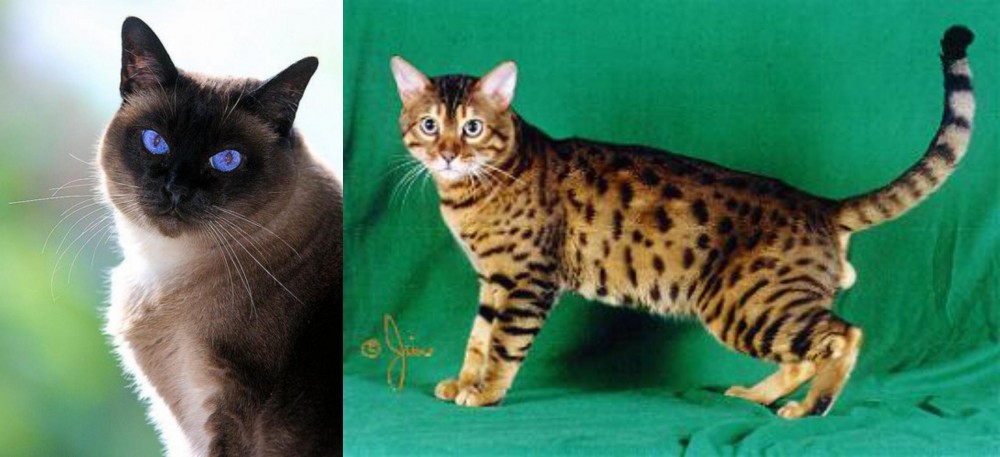 Applehead Siamese is originated from Thailand but Bristol is originated from United States. Both Applehead Siamese and Bristol are having almost same weight. Applehead Siamese may live 5 years more than Bristol. Both Applehead Siamese and Bristol has same litter size. Both Applehead Siamese and Bristol requires Low Maintenance.
Applehead Siamese is originated from Thailand but Bristol is originated from United States. Both Applehead Siamese and Bristol are having almost same weight. Applehead Siamese may live 5 years more than Bristol. Both Applehead Siamese and Bristol has same litter size. Both Applehead Siamese and Bristol requires Low Maintenance.
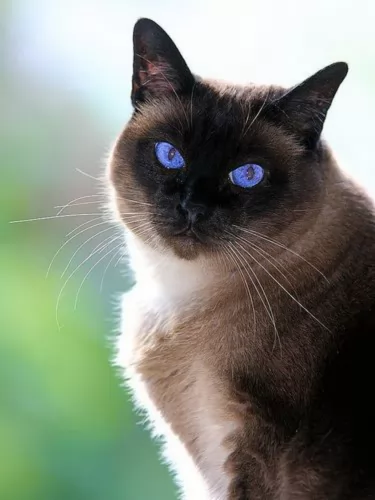 As the traditional Siamese cats from Siam, now known as Thailand, this ancient breed of cat goes back to 1350AD. It is believed that these Traditional Siamese cats were first exported to the west in the 19th century.
As the traditional Siamese cats from Siam, now known as Thailand, this ancient breed of cat goes back to 1350AD. It is believed that these Traditional Siamese cats were first exported to the west in the 19th century.
The Applehead is a Siamese cat that looks the way Siamese looked when they were first brought out to the United States in the 19th century. Breeding with other cat breeds is what developed the Applehead Siamese.
The Applehead seal point was also imported to Britain. Breeders have developed other point colors and head shapes by cross-breeding long- and short hairs, but all Siamese are essentially bred from the Applehead seal point.
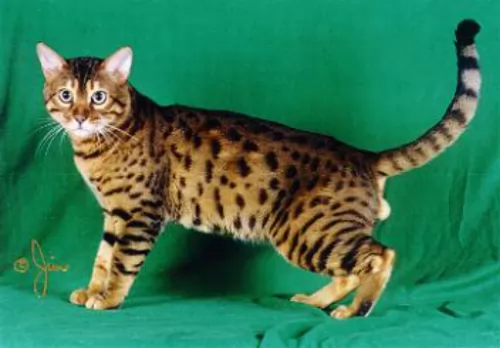 The Bristol cat hails from Texas and was developed during the 1980s, using a south American wild cat and domestic cats.
The Bristol cat hails from Texas and was developed during the 1980s, using a south American wild cat and domestic cats.
The Bristol cat isn’t well-known and in fact, its origins are shrouded in mystery.
The cat was recognized and admitted into the TICA (The International Cat Association. It is looked upon as a hybrid breed or a designer cat.
Nobody seems to know when the first Bristol cat was even bred. Because of its exotic nature, it is believed to be a cross between the American Shorthair and the margay or similar breed.
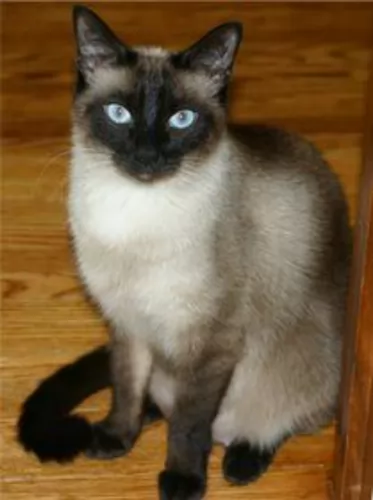 There is no denying that the very recognizable Siamese cats are one of the most popular cat breeds there are, known also for being very vocal.
There is no denying that the very recognizable Siamese cats are one of the most popular cat breeds there are, known also for being very vocal.
The female Applehead weighs between 3 and 5kg and the male might weight a bit more, as much as 6,8kg.
Siamese cats are all born white but as they mature they develop their deeper color points. There are actually 3 types of Siamese cats, with the Traditional Siamese being known as the Apple Head - the original breed of Siamese.
This particular Siamese is a bit bigger and larger-boned than the modern Siamese, with the body being more muscular and heavier. The head of the cat is fairly round- or apple-shaped with the eyes also being somewhat rounder than other types of cats.
The legs are long and the tail long too and the cat has a fairly short, silky coat.
These cats look intelligent and they are, so much so, that it will be important to present them with lots of toys that make them think and require some skills.
They also love receiving attention from their human owners and although they are also vocal, they don’t talk as much as the modern Siamese cats.
They're curious and playful and don’t like being left alone for too long. They also get on well with children and other pets in the home but are inclined to become more attached to one particular person, wanting to follow their favorite human around.
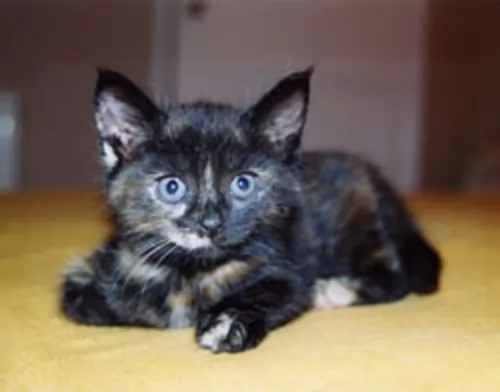 Bristol cats are medium-sized and muscular, powerful cats. They are much like Bengal cats. They have a smokey charcoal appearance while others have quite a bit of white on them.
Bristol cats are medium-sized and muscular, powerful cats. They are much like Bengal cats. They have a smokey charcoal appearance while others have quite a bit of white on them.
They also have rosettes and small rounded ears. The origins of the Bristol breed are uncertain but it seems a multi-colored cat was adopted by a United States Army captain in Australia.
The cat was so adored it was brought back when they returned to the United States. The cat was already pregnant and she gave birth to 2 kittens. The coats are shiny and short-haired with spots and lines of fawn, grey and brown mostly with the eyes being green.
The Bristol cat has a very pleasing disposition – being amicable, playful, and loving. They’re intelligent cats too but they need to spend time in solitude as well.
They definitely don’t respond and bond to everyone in the human family but tend to respond to only one person.
These Bristol cats are cunning and self-confident and because of their wild side, they will need a large area to roam. This is definitely not a cat for city life.
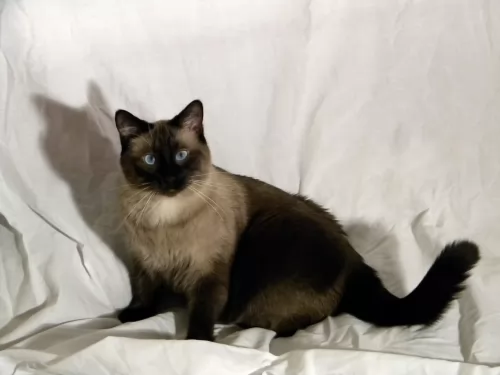 Applehead Siamese cats are very friendly and loving pets. They are intelligent and very beautiful too, with their amazing blue eyes.
Applehead Siamese cats are very friendly and loving pets. They are intelligent and very beautiful too, with their amazing blue eyes.
You will enjoy their friendship as they are prepared to become totally devoted to you, and of course, your playful cat will provide you with lots of laughs and entertainment too. The Applehead Siamese is known to make a splendid pet for you and once you've owned one, you'll think twice before getting another cat breed.
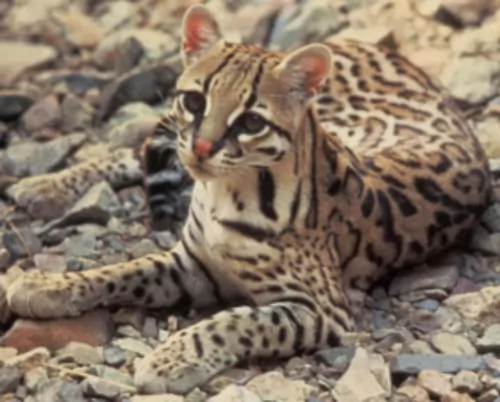 The Bristol cat is beautiful all right, but once again humans should just leave wild cats alone in the bush.
The Bristol cat is beautiful all right, but once again humans should just leave wild cats alone in the bush.
Mixing them with domestic cats doesn’t work in the long run, and many of these cats land up in shelters because of unruly behavior. The Bristol cat is part wild and it doesn’t seem to have a future although there isn’ enough information online to really know what its future is.
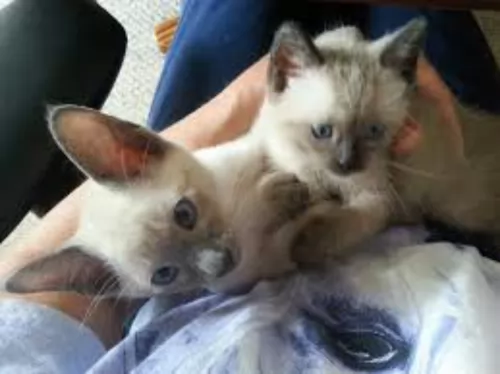 These are a healthy breed of cat and they have always been known to live longer than the modern Siamese cats.
These are a healthy breed of cat and they have always been known to live longer than the modern Siamese cats.
With good care they can live to be up to 20 to 25 years of age. Good nutrition and a loving environment can help to eliminate diseases that the Siamese might have to endure. Some of these can be a blockage in the stomach, skin cancer, feline diabetes, hip dysplasia, and disrupted visual pathway which causes a squint.
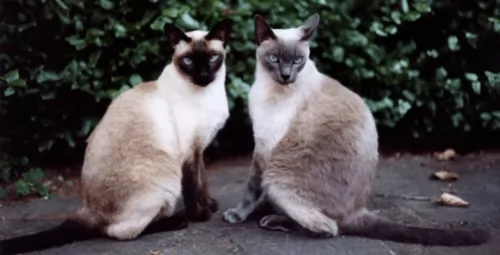 These cats have special nutritional needs and you want to be aware that obesity is a growing problem with modern-day cats. Make sure your Applehead has a healthy diet to maintain a healthy weight so that he keeps his lithe, lean looks.
These cats have special nutritional needs and you want to be aware that obesity is a growing problem with modern-day cats. Make sure your Applehead has a healthy diet to maintain a healthy weight so that he keeps his lithe, lean looks.
You might want to try a little bit of homemade food to enhance your Siamese cat's commercial food which is a mix of top quality meat-based wet- and dry food. You can speak to your vet about feeding your Applehead Siamese because you want to know which food is best for such a cat.
These days the best cat food manufacturers make sure that their cat foods are made up of tasty ingredients such as real chicken and whole brown rice formulated with the right balance of vitamins and minerals to meet the dietary needs of every cat breed and the season of life they are in.
Because of the Siamese cat’s short hair with no undercoat, the cat requires less brushing than other cats.
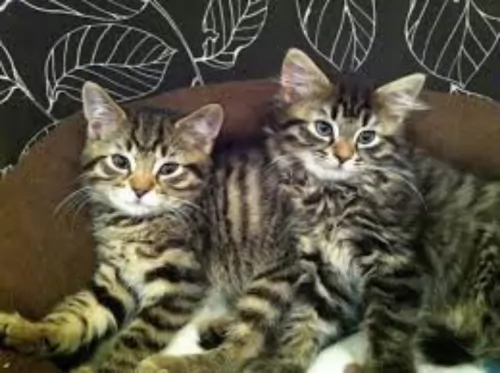 The diet of a cat such as the Bristol will include small rodents, however once domesticated, these cats will need a diet high in protein. The cat is a carnivore and to be healthy it will require high-quality premium commercial cat food that is appropriate for the age of your cat and his health status.
The diet of a cat such as the Bristol will include small rodents, however once domesticated, these cats will need a diet high in protein. The cat is a carnivore and to be healthy it will require high-quality premium commercial cat food that is appropriate for the age of your cat and his health status.
The best cat food has taurine in it, an essential protein that cats can only obtain through quality food. Your adult Bristol cat may prefer eating several smaller meals and this is actually a good idea as smaller frequent meals help towards greater urinary tract health.
If you want a healthy cat, you have to be diligent with providing such a cat with good food that is high in protein. If you aren’t sure, your veterinarian will be able to advise you on what to feed your new cat or kitten.
Factors such as age, size, activity levels, and health make a difference to what you feed your cat, how much and how frequently.
Get into a habit of reading and understanding the labels on the cat food packaging. Certainly, every cat requires taurine, an essential amino acid. You will also need to ensure fresh, cool water day and night.
Always take your pet to the veterinarian if he is lethargic ad disinterested in his food.
Most cats are clean, but you should brush or comb your Bristol cat regularly as the brushing helps keep your cat's coat shiny and also reduces the amount of hair during shedding.
Provide your Bristol cat with a dry, warm sleeping area and keep the bedding clean.
Your Bristol cat needs to wear a safety collar and an ID tag. These ID tags or an implanted microchip can help ensure that your Bristol cat is returned if he becomes lost.
Cats scratch, and cutting your cat’s nails will keep the nails blunt. Nonetheless, to prevent your furniture from being scratched, provide your cat with a strong scratching post covered with a rough material such as sisal or tree bark.
Bristol cats are independent and they don’t require any kind of special care. Certainly, they require large areas for their active lifestyle as well as a shallow pool for swimming.